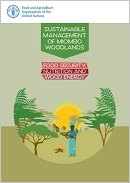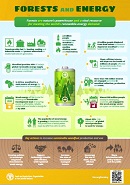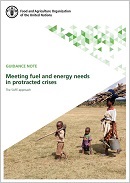Publications
Recent publications
 Sustainable management of Miombo woodlands – Food security, nutrition and wood energy
Sustainable management of Miombo woodlands – Food security, nutrition and wood energy
The Miombo woodland is a vast African dryland forest ecosystem covering close to 2.7 million km2 across southern Africa. The woodlands are characterized by the dominance of Brachystegia species, either alone or in association with Julbernardia and Isoberlinia species. It is estimated that the woodlands – through their numerous goods and services, which include various non-wood forest products and woodfuels, sustain the livelihoods of more than 100 million rural poor and 50 million urban people. [more]
 The charcoal transition: greening the charcoal value chain to mitigate climate change and improve local livelihoods
The charcoal transition: greening the charcoal value chain to mitigate climate change and improve local livelihoods
The overall objective of the publication is to provide data and information to allow for informed decision-making on the contribution sustainable charcoal production and consumption can make to climate change mitigation. More specifically, the publication aims to answer the following questions: - What are the climate change impacts of the current practices on charcoal production and consumption worldwide and across regions? - What is the potential of sustainable charcoal production in GHG emission reductions and how such potential can be achieved? - What are the key barriers to sustainable charcoal production and what actions are required to develop a climate-smart charcoal sector? [more]
 The charcoal transition: executive summary
The charcoal transition: executive summary
The executive summary to the publication "Charcoal transition: greening the charcoal value chain to mitigate climate change and improve local livelihoods". Available in Arabic, Chinese, English, French, Russian and Spanish.
 Incentives to promote sustainable wood energy in sub-Saharan Africa: Policy Brief
Incentives to promote sustainable wood energy in sub-Saharan Africa: Policy Brief
Woodfuel contributes to more than half of energy consumption in 22 countries of sub-Saharan Africa, and over two-thirds of the households in Africa use wood as their main fuel for cooking, heating and water boiling. While its use is expected to further increase due to population growth and urbanization, there is hardly any systematic approach to developing a sustainable wood energy sector in the region. Absence of effective policies governing wood fuel production, trade, conversion, and consumption and the resultant indiscriminate and inefficient wood fuel collection and use contributes to continued deforestation and forest degradation. [more]
 Infographic: forests and energy
Infographic: forests and energy
Forests are nature’s powerhouse and a vital resource for meeting the world’s renewable-energy demand. Available in Arabic, Chinese, English, French, Russian and Spanish.
 Forestry for a low-carbon future - Integrating forests and wood products in climate change strategies
Forestry for a low-carbon future - Integrating forests and wood products in climate change strategies
Following the introduction, Chapter 2 provides an overview of mitigation in the forest sector, addressing the handling of forests under UNFCCC. Chapters 3 to 5 focus on forest-based mitigation options – afforestation, reforestation, REDD+ and forest management – and Chapters 6 and 7 focus on wood-product based options – wood energy and green building and furnishing. The publication describes these activities in the context of UNFCCC rules, assessing their mitigation potential and economic attractiveness as well as opportunities and challenges for implementation. Chapter 8 discusses the different considerations involved in choosing the right mix of options as well as some of the instruments and means for implementation. Chapter 8 also highlights the co-benefits generated by forest-based mitigation and emphasizes that economic assessment of mitigation options needs to take these benefits into account. The concluding chapter assesses national commitments under UNFCCC involving forest mitigation and summarizes the challenges and opportunities [more]
 Assessment of Forest Resource Degradation and Intervention Options in Refugee-Hosting Areas of Western and Southwestern Uganda
Assessment of Forest Resource Degradation and Intervention Options in Refugee-Hosting Areas of Western and Southwestern Uganda
This study identifies potential intervention options to mitigate pressure on forest resources, restore degraded land, enhance sustainable woodfuel supply and contribute to resilience-building of both the displaced and host communities. The findings of this study were used to add to the evidence base for the World Bank/Government of Uganda (GoU) investment package ‘Investing in Forests and Protected Areas for Climate-smart Development project’, to be supported under the Refugee Sub-Window of the International Development Association’s 18th and 19th funding rounds. [more]
 Rapid Assessment of Natural Resource Degradation in Refugee Impacted Areas in Northern Uganda
Rapid Assessment of Natural Resource Degradation in Refugee Impacted Areas in Northern Uganda
This study summarizes the main findings and recommendations of the assessment, updated to reflect the most recent (April 2019) refugee population figures. These are expected to guide WB support to the Government of Uganda (GoU)—including the Development Response to Displacement Impacts Project (DRDIP) and an IDA disbursement window for refugee-affected countries—as well as provide information of wider strategic value to other agencies concerned with the impacts of refugees on natural resources in Uganda. [more]
 Managing forests in displacement settings
Managing forests in displacement settings
The massive increase in demand for woodfuel for cooking caused by sudden influxes of refugees and other displaced people is usually the main driver of forest degradation and deforestation in displacement settings. It places enormous pressure on nearby forests and woodlands and is often a source of tension between the host and displaced communities. A lack of sufficient cooking fuel also has an impact on the nutrition and health of vulnerable people in such settings. This document aims to contribute on a sustainable forest management in displacement settings for building resilience and laying the basis for long-term solutions. In particular, well-planned forestry interventions can ensure a sustainable supply of woodfuel, timber and non-wood forest products for those communities, thereby helping ensure their well-being [more]
 Using Prosopis as an energy source for refugees and host communities in Djibouti, and controlling its rapid spread
Using Prosopis as an energy source for refugees and host communities in Djibouti, and controlling its rapid spread
FAO, in collaboration with Djibouti’s Ministry of Agriculture, Water, Fishery, Livestock and Marine Resources and Ministry of Housing, Urban Planning and Environment, and the United Nations High Commissioner for Refugees, conducted the study presented in this report to assess the use of Prosopis woody biomass as a source of energy and options for increasing the efficiency of woodfuel supply chains. The study used socio-economic data collected through interviews, focus-group discussions, a desk review and a field visit, and a remote sensing analysis of Prosopis distribution, combined with field data, in four areas of interest in Djibouti: Douda, As Eyla, Tadjourah, and Hanlé.
 Cost-benefit analysis of forestry intervetions for supplying woodfuel in a refugee situation in the United Republic of Tanzania
Cost-benefit analysis of forestry intervetions for supplying woodfuel in a refugee situation in the United Republic of Tanzania
This report presents a cost–benefit analysis of three forestry interventions aimed at producing a sustainable supply of woodfuel and reducing land degradation and deforestation in the vicinity of three refugee camps (Mtendeli, Nduta and Nyarugusu) in the Kigoma region, United Republic of Tanzania. The proposed forestry interventions are: forest rehabilitation; wood-energy plantations; and agroforestry [more]
 Assessing woodfuel supply and demand in displacement settings - A technical handbook
Assessing woodfuel supply and demand in displacement settings - A technical handbook
This manual presents a methodology for assessing woodfuel supply and demand at the level of the displacement camp through the collection of primary data in the field and remote sensing analysis. The methodology uses a multi-sectoral approach to assess the energy-related needs and challenges of people in both displaced and host communities. The first part of the manual presents the methodology for assessing demand for woodfuel, which is structured around four sequential steps. Each step provides guidance and tools for collecting data and information, based on the specific targeted area and population. The second part of the manual describes the methodology for assessing the woodfuel supply of the targeted area, based on a combination of field measurements and temporal change analysis of very high resolution satellite imagery for the different land cover classes that provide woody biomass. [more]
 Meeting fuel and energy needs in protracted crises
Meeting fuel and energy needs in protracted crises
This note focuses on the topic of access to fuel and energy in protracted crises, and the possible solutions using the SAFE approach, illustrated by case studies from FAO's interventions in protracted crisis situations. Access to fuel and energy – vital for food security – is often highly constrained in protracted crises. The risks posed by limited access to fuel and energy are multiple and diverse depending on the context, including malnutrition, environmental degradation, a high work burden for women, gender-based violence (GBV) and unsustainable livelihood activities. [more]
 Rapid woodfuel assessment - 2017 baseline for Bidi Bidi refugee settlement, Uganda
Rapid woodfuel assessment - 2017 baseline for Bidi Bidi refugee settlement, Uganda
Uganda is host to more than 1 million refugees who have fled famine, conflict and insecurity in the neighbouring countries of Burundi, the Democratic Republic of the Congo and South Sudan. The recent influx of refugees from South Sudan prompted one of Uganda’s most severe humanitarian emergencies and led to the establishment of the Bidibidi settlement in Yumbe District in August 2016. The Bidibidi refugee settlement is now the largest refugee-hosting area in the world with 272 206 refugees. It has increased pressure on the environment due to tree felling for settlement establishment and to meet ongoing household demand for woodfuel for cooking and heating. [more]
Wood energy assessments
Methodologies
WISDOM for cities [EN / FR] (2008)
Wood-energy supply/demand scenarios WISDOM [EN / FR] (2003)
A guide to woodfuel surveys (2002) [EN / ES /FR]
Basics of wood energy planning (2000)
Long-range energy alternatives planning (LEAP) and wood energy (1998)
Energy planning & rural development (1990)
Woodfuel surveys (1983)
Studies
Woodfuel supply and demand (georeferenced)
Serbia (2012ongoing)
Darfur (2011)
Rwanda (2011)
Peru [ENresults / ES results/ESmethodology](2010)
Argentina [ES] (2009)
Castilla y Leon / Spain [ES] (2009)
Bangui / Central African Republic (2009)
Mexico (2007)
South-east Asia (2007)
East Africa (2006)
Slovenia (2006)
Woodfuel supply and demand (general)
Liberia (2000)
Seychelles (2000)
Namibia (2000)
Mozambique (2000)
Eritrea (2000)
Zambia (1998)
Phnom Penh / Cambodia (1998)
Asia (1997)
Sudan (1994)
Woodfuel demand
Asia (2003)
Near East (2000)
Lesotho (2000)
Gambia (2000)
Africa (1999)
Asia (1997)
Europe & OECD (1997)
Latin America [ES] (Volume I & Volume II)(1993)
Woodfuel supply
Wood fuel supply in developing countries [EN / FR / ES] (1983)
Definitions and data quality
Terminology
Unified bioenergy terminology - UBET (2004)
Unified wood energy terminology - UWET [EN / ES / FR] (2003)
Comparative data studies
Interactive Wood Energy Statistics i-WESTAT (2005)
Comparison of wood energy data in Africa (EN / FR) (2001)
Technologies
Woodfuel production
Plantations and Wood Energy [EN] (2001)
Charcoal production
Simple technologies for charcoal making [EN/ FR / ES] (1987)
Industrial charcoal making (1985)
Clean cookstoves
Industrial and institutional stoves in Asia (2001)
Stoves & carbon market (1999)
Lessons learned from Asia (1998)
Improved stove selection and dissemination (1997)
Heat and electricity generation
Nicaragua: Electricity from eucalyptus and bagasse [ES] (1997))
Argentina: Autoproduction of electricity from wood and wood waste[ES] (1994)
Mexico: Wood energy in rural industries - five case studies [ES] (1991)
Energy conservation in the mechanical forest industries [EN / ES] (1990)
Wood gas as Engine Fuel [EN / ES] (1986)
Power and heat generation [EN] (1980)
Wood energy and policy
Climate change
Woodfuels and climate change mitigation - case studies (Brazil, India, Mexico) (2010)
What woodfuels can do to mitigate climate change (2010)
Forest policy
European Forestry Commission: Wood energy for europe: status and outlook [EN, ES] (2010)
African Forestry Commission: Regional perspectives for forests and energy [AR, EN, FR] (2008)
European Forestry Commission: European Forest Week - forest and energy [EN / FR / ES / RU] (2008)
FAO committee on forests: forests and energy [AR/ ZH / EN/ FR / ES] (2007)
European Forestry Commission: wood energy and forest policy [EN, ES, FR] (2006)
Sustainable development
Criteria and indicators for sustainable woodfuels (2010)
Criteria and indicators for sustainable woodfuels - case studies (Brazil, Guyana, Nepal, Philippines, Tanzania) (2009)
Small Scale Bioenergy Initiatives (2009)
Forestry Paper 154: Forests and energy [AR/ ZH / EN/ FR / ES] (2008)
Forests and energy in OECD countries (2007)
Forests and energy in developing countries (2007)
Economic analysis of wood energy systems (2002)
Capacity building for wood energy in Asia (1998)
Wood energy in the regional outlook study: Asia (1997)
Wood energy for sustainable development (1996)
Productos forestales y energía para el desarrollo rural [ES] (1993)
Nairobi Programme of Action and wood energy (1993)
Technical and economic aspects for rural industries (1987)
Wood for energy [EN / ES] (1982)
Renewable energy
XIII World Forestry Congress - forests and energy (2009)
Forestry Paper 154: Forests and energy [AR/ ZH / EN/ FR / ES] (2008)
Forests and energy/Corr.1 [EN / ES] (2008)
Forest & energy in OECD countries (2007)
Forest and energy in developing countries (2007)
Bioenergy in G8+5 countries (2003)
Información sobre madera para energía en América Latina [ES] (2001)
Wood energy regulations in Europe (2000)
Wood Energy: Legal Issues in the Forestry Sector (1998)
Forests and energy in Latin America [ES] (Volume I & Volume II)(1993)
Gender
Energy and gender in rural sustainable development (2006)
Gender aspects of fuelwood flows in Sri Lanka (1999)
Women in wood energy development (1995)
Gender & wood energy (1995)
Other
Old newsletters (1997 - 2002)
Forest energy forum No. 9 (2002)
Forest energy forum No. 8 (2001)
Forest energy forum No. 7 (2000)
Forest energy forum No. 6 (2000)
Forest energy forum No. 5 (1999)
Forest energy forum No. 4 (1999)
Forest energy forum No. 3 (1999)
Forest energy forum No. 2 (1998)
Forest energy forum No. 1 (1997)
Workshop proceedings
WISDOM expert consultation (2009)
Energy and the Forest Products Industry (2007)
Atelier régional sur l'information en bois-énergie [FR] (2001)
Regional wood energy workshop - Africa (2000)
Wood energy planning, policies and strategies (Philippines) (1998)
Reunión regional sobre Biomasa para la producción de energía y alimentos [ES] (1997)
Reunión Regional sobre generación de electricidad a partir de biomasa [ES] (1996)
Seminario regional sobre los sistemas dendroenergeticos optimizados [ES] (1994)
Unasylva & wood energy
Unasylva 211 - Wood energy [EN/ FR / ES] (2002)
Unasylva 33 vol II - Wood energy for UN conference in Nairobi [EN/ FR / ES] (1981)
Unasylva 33 vol I - Wood energy for UN conference in Nairobi [EN/ FR / ES] (1981)
Unasylva 29 - wood for fuel [EN/ FR / ES] (1977)
Other / unpublished drafts
Plantations and wood energy (2001)
